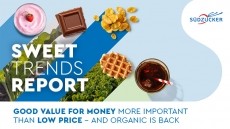Fructan responsible for symptoms in the gluten-intolerant, study claims

Writing in Gastroenterology, the team identify the carbohydrate fructan as being more likely to induce symptoms in those reporting sensitivity to wheat, rye and barley.
The study also raises the issue of using the term ‘NCGS’ and its distinction from irritable bowel syndrome (IBS).
It also raises doubts over the need for a gluten-free diet in such patients, as some reports note the benefits gained from a gluten-free diet in IBS patients.
“The results (of the study) indicate that fructans are more likely the culprits,” said the team, led by Professor Knut E. A. Lundin, head physician at Oslo University Hospital.
“The improvement seen with a gluten-free diet (in IBS patients) may not be caused by removal of the gluten protein per se, but rather the reduction of wheat fructans.”
While NCGS patients report feeling better when avoiding gluten, questions remain as to the long-term effects of those following a modern gluten-free diet without direct underlying medical reasons.
Gluten-free foods often have less dietary fibre and other micronutrients and research has pointed to a relationship between low-gluten diets and a higher risk of Type 2 diabetes.
Additionally, a month on a gluten-free diet was enough to lower populations of beneficial gut bacteria in trial subjects.
Study details
The study enrolled 59 individuals on a gluten-free diet (for whom coeliac disease had been excluded).
They were then randomly assigned to groups placed on diets containing gluten (5.7 grams (g)), fructans (2.1 g), or placebo, concealed in muesli bars, for seven days.
Following a minimum 7-day washout period (until the symptoms induced by the previous challenge were resolved), participants crossed over into a different group, until they completed all three challenges (gluten, fructan, and placebo).
Symptoms were measured by gastrointestinal symptom rating scale irritable bowel syndrome (GSRS-IBS) version.
Participants consuming with the fructan muesli bar scored higher than for those consuming gluten. On average, no difference was noted in reported symptoms between the gluten and placebo groups.
Revising assumptions
“This may explain why people with irritable bowels often improve on gluten-free diets but don’t make a full recovery,” said Dr Jane Muir, study author and senior research fellow at Monash University.
“By cutting out wheat, they eliminate a large portion of fructans from their diets, but they can still run into trouble eating other high-fructan foods like onions and garlic. Some gluten-free products like chickpea crisps also contain fructans.”
Only a small number of placebo-controlled studies have managed to confirm gluten’s purported effects, explaining the difficulty in why gluten poses such a problem for non-coeliacs.
Accusation were levelled at gluten due to its role in celiac disease, a fact supported by reports of patients improving in health after cutting wheat from their diet.
If fructans are discovered to be the cause of the gastrointestinal distress, foods that were previously off the menu would be allowed.
Soy sauce is one example as it is a gluten-containing food but is low in fructan content. Likewise, sourdough bread undergoes a fermentation process that removes wheat’s fructans.
Source: Gastroenterology
Published online ahead of print: doi.org/10.1053/j.gastro.2017.10.040
“Fructan, Rather Than Gluten, Induces Symptoms in Patients With Self-reported Non-celiac Gluten Sensitivity.”
Authors: Skodje GI, Sarna VK, Minelle IH, Rolfsen KL, Muir JG, Gibson PR, Veierød MB, Henriksen C, Lundin KEA



























